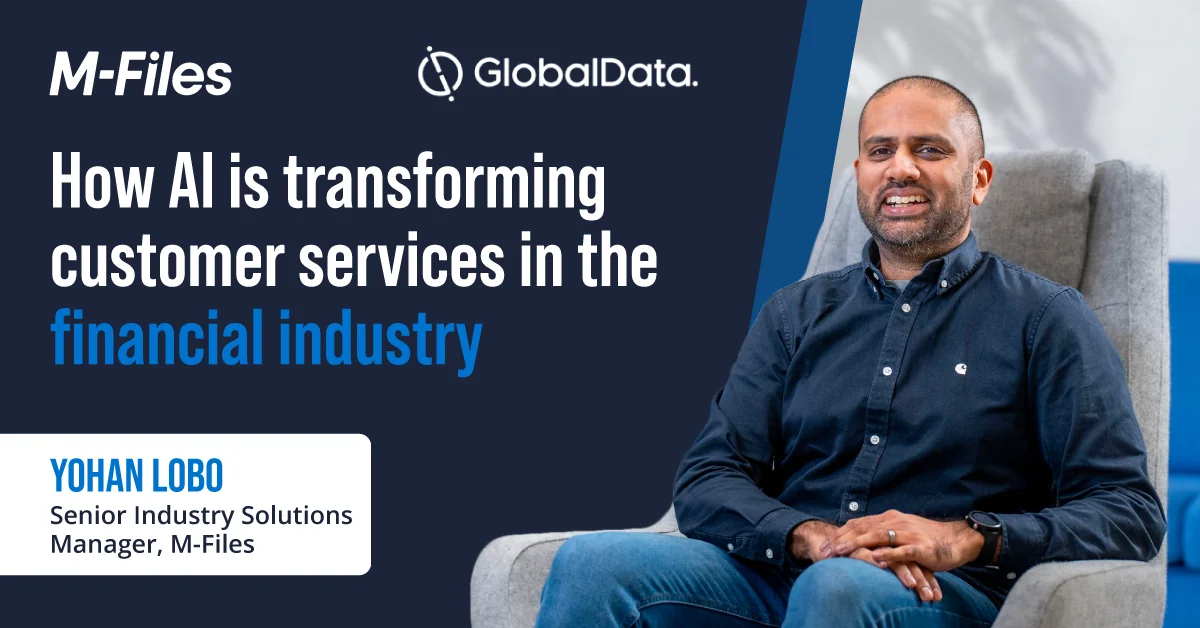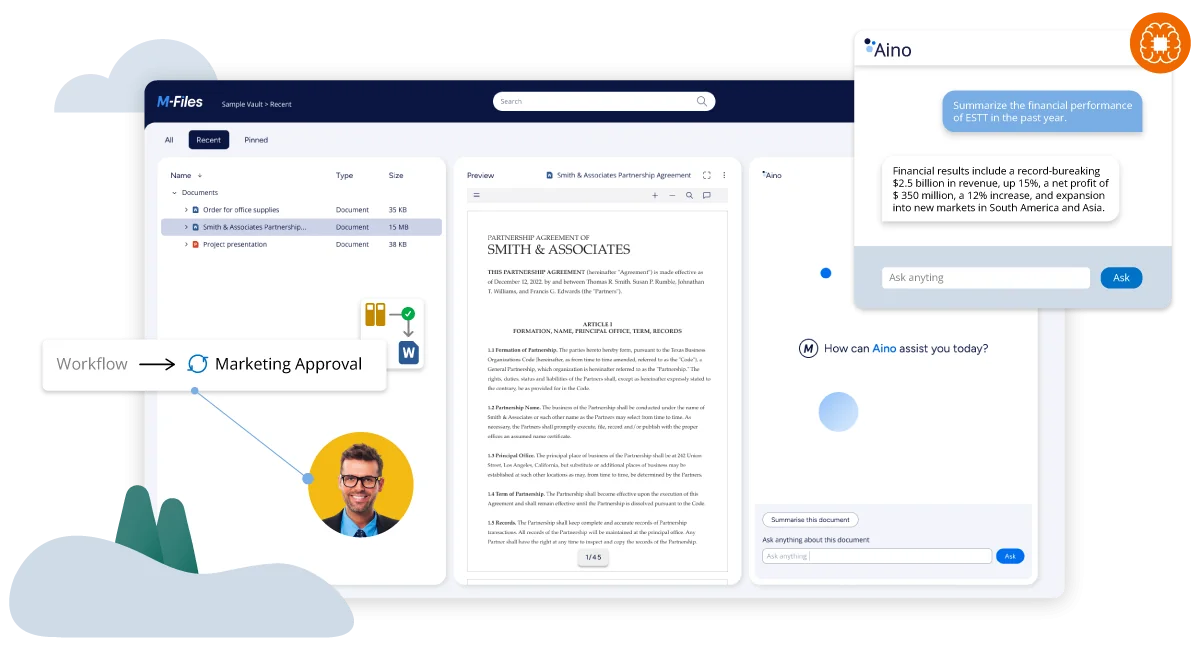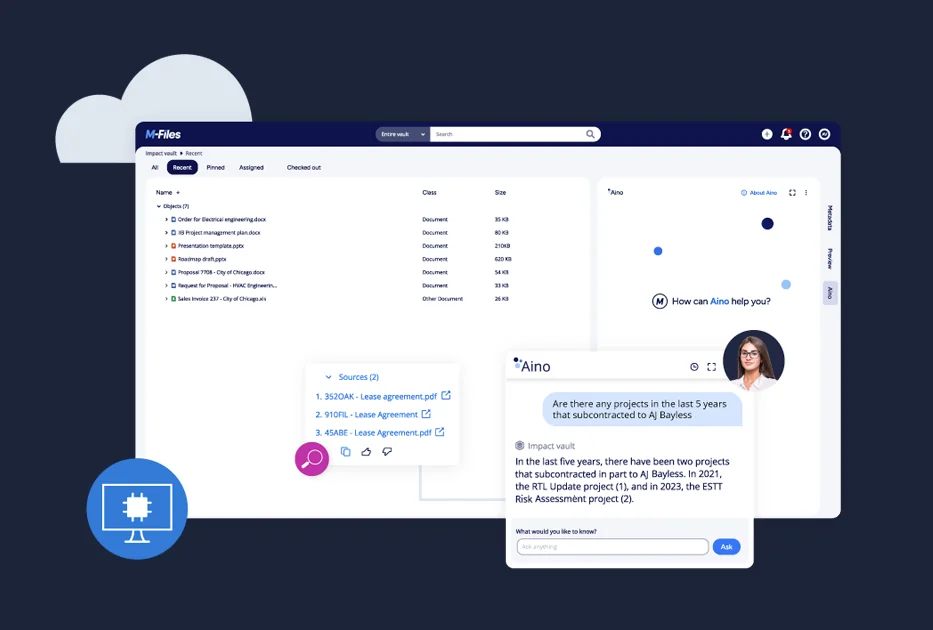How AI Transforms Customer Service in the Financial Industry

Yohan Lobo, Senior Manager, Industry Solutions, M-Files, has been featured in Global Data to discuss how Artificial intelligence (AI) has emerged as a crucial enabler of such transformation in the financial sector.
Read the full article on How AI is transforming customer services in the financial industry - GlobalData.
"Data and trust are at the heart of delivering efficient services and contributing to business longevity; however, inconsistent customer service can erode this progress. The latest UK Customer Satisfaction Index (UKCSI) reported customer satisfaction now sits at its lowest level since July 2010, warning that persistent low levels of satisfaction has the potential to undermine the already challenging economic recovery.
In light of this, business leaders need to better understand the evolving expectations of their customers and cultivate a customer first culture. Artificial intelligence (AI) has emerged as a crucial enabler of such transformation in the financial sector, demonstrating consistent results in boosting customer support while contributing to employee productivity.
By strategically reallocating IT budgets toward AI innovations, businesses can effectively counter the competitive need for efficient consumer-centric services and cultivate a customer first culture and efficient operations.
Blending AI and Human Agents for Document Efficiency
Firms typically produce a variety of documents – client correspondence, reports, contracts - which can be difficult to organise. Compounded by the variability in document structures and formats, managing this data is challenging resulting in slower decision-making and decreased productivity.
With labelled examples of historical data, AI-powered document processing can automatically recognise patterns and structural similarities to classify these documents into relevant categories.
Firms can tailor the AI tool to maintain document version control and ensure compliance by tracking revisions and access permissions and flagging all potential non-compliant clauses that doesn’t align with industry policies.
This blend of AI and human agents can elevate compliance in financial processes while eliminating potential human errors and excessive time spent on document processing tasks.
Turning Data into Strategy with AI Insights
Access to trusted and personalised financial advice is a main priority for many customers and using an integrated AI model, firms can analyse industry trends, capital market trends and customer behaviour to identify insights and highlight relevant products offering and recommendations that would be otherwise time-consuming for human agents to gather.
These data analytic results can also offer customer targeting strategies that employees can implement to increase customer trust and loyalty and position the business as a leader in strategic and accurate financial insights.
Using AI to Evolve Customer Onboarding
The onboarding process for new clients is a pivotal phase for financial institutions as it sets the stage for the ongoing relationships. The infusion of AI technologies can analyse creditworthiness based on historical data, credit scores, and transaction patterns provided by the customer as well as meticulously analysing biometric data against databases to ensure secure identification.
This minimises the risk of fraud and significantly enhances the overall efficiency of the onboarding journey without the need for back-and-forth between human agents and customers. Furthermore, these tools can use this information to create customer profiles that contain personalised investment preferences and recommendations in a fraction of the usual time it would take workers. This approach enhances the customer experience and aligns individual needs.
Optimising Customer Interactions with AI and Chatbots
Using a combination of artificial intelligence and chatbots, financial firms can allocate routine requests to AI that redirect users to human agents as needed, ensuring instant and efficient support for customers. Using both chat and voice, AI can provide advice and cross-sell opportunities based on interactions as well as forming audio transcriptions that gathers key details from conversations to create a knowledge base for staff to access and obtain precise information easily.
This not only cuts down on time spent by human agents but also equips them with the tools needed to understand the context of customer queries and provide accurate responses for a positive customer service experience.
By removing the friction out of processes where speed is of essence, firms can strengthen process efficiency to provide instant customer support and free up agent time to focus on complex queries without compromising accurate service levels.
Speeding Up Detection and Slowing Down Fraud
For many employees, uncovering fraud and risk is a time-consuming process and financial firms had one of the highest breach costs of any industry, partly due to the extended average time of 168 days to identify and 51 days to contain a breach.
Sophisticated AI algorithms can analyse vast amounts of transactional data more quickly to identify patterns indicative of fraudulent activity and flag it for review. From these interactions, it can learn to continuously improve their detection capabilities, staying ahead of evolving fraudulent schemes.
The combination of human expertise with a digital workforce to help financial institutions scale and adapt quickly creates a unique advantage in the battle against financial crime and develop areas of the business that not only protects customers but builds their confidence and trust in the firm's ability to protect their financial assets and data.
Overall Business Empowerment with AI
It is evident that the role of artificial intelligence will continue to accelerate, offering opportunities for financial firms to streamline processes and amplify their competitive edge. In today’s fast-paced and regulated business landscape, the traditional methods of relying solely on human expertise and manual processes are no longer sufficient.
Embracing AI can result in easier fraud detection, data quality assurance, and process efficiency that outperform competitors in acquiring customers and delivering a superior customer experience.
If integrated correctly, AI in customer services can produce time-efficient and personalised experience resulting in higher levels of customer satisfaction and loyalty. Firms embracing these technologies can pave the way for a data-driven future where insights lead to innovations for both customers and the business."
Published October 14th, 2024.
Ready to learn more about M-Files?
Check out our free trial and discover how M-Files helps manufacturers boost efficiency, ensure compliance, and achieve project success.










